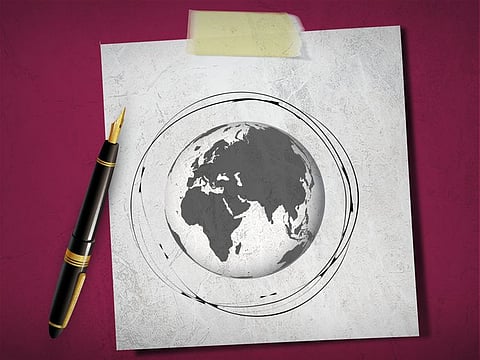Connecting the dots: How industrialisation fuelled climate change
To repair our planet, we must urgently reduce emissions and protect the natural world

Scientific inquiry into the current deterioration of the environment has firmly established an undeniable link between human activities and climate change. The consequences of our relentless pursuit of production, consumption, and waste are glaringly evident in the gradual degradation of Earth's delicate ecosystems.
The speed and scale of human activities impacting our ecosystem have grown exponentially, primarily due to the industrial revolution—a transformative era that has dramatically reshaped our lives, our way of existence, and the prospects for our planet's future.
According to environmental expert John Rafferty, "atmospheric carbon dioxide, a primary driver of global warming, existed in concentrations of 275 to 290 parts per million by volume (ppmv) before 1750 and increased to more than 400 ppmv by 2017." This seismic shift in atmospheric composition unequivocally signifies environmental degradation in the relentless pursuit of natural resources.
Consequently, the link between human activities since the industrial revolution and climate change is irrefutable. Furthermore, the industrial revolution not only contributed to climate change but also catalyzed global challenges, such as widespread water and air pollution, and the depletion of biodiversity and wildlife habitats.
Greenhouse gas levels soaring
A significant avenue through which the industrial revolution exacerbated climate change was by fueling air pollution. Rafferty elucidates that "to sustain the output of every manufactured good, natural resources—water, trees, soil, rocks and minerals, wild and domesticated animals, etc.—were transformed, reducing the planet's valuable natural capital."
This transformation of natural resources into manufactured goods triggered escalating carbon dioxide emissions and air pollution from factories and industrial processes. Air pollution, in turn, has played a pivotal role in climate change, primarily by intensifying global warming as greenhouse gas levels soar.
As greenhouse gases accumulate in the atmosphere, they contribute to long-term air pollution challenges, such as smog and acid rain, as these gases are eventually released into the atmosphere, disrupting natural processes. Data from the Royal Society reveals that since preindustrial times, "the atmospheric concentration of CO2 has increased by over 40%, methane has increased by more than 150%, and nitrous oxide has increased by roughly 20%. More than half of the increase in CO2 has occurred since 1970."
Additionally, the industrial revolution has fueled climate change by triggering global warming, as evident in diminishing ice cover and warming oceans. The National Centre for Atmospheric Science (NCAS) notes that "Arctic summer sea ice cover has shrunk dramatically."
Furthermore, "the heat content of the ocean has increased, and global average sea level has risen by approximately 16 cm (6 inches) since 1901, due to the expansion of warmer ocean water and the addition of meltwaters from glaciers and ice sheets on land."
Decline in biodiversity
This data underscores the profound, long-term consequences of the industrial revolution, including how global warming and shifting precipitation patterns have altered the geographical ranges and life cycles of numerous plant and animal species.
Furthermore, the excess carbon dioxide released into the atmosphere by industrial processes is being absorbed by the ocean, resulting in ocean acidification, which, in turn, disrupts ocean habitats, causing habitat loss and the deterioration of coral reefs through coral bleaching—a dire threat to the Great Barrier Reef in Australia.
Moreover, the industrial revolution has led to a decline in biodiversity. The World Wildlife Fund defines biodiversity as encompassing "all the different kinds of life you'll find in one area—the variety of animals, plants, fungi, and even microorganisms like bacteria that make up our natural world."
The Natural History Museum highlights the rapid decline in biodiversity due to habitat destruction, degradation, and unsustainable use of natural resources—a consequence of mass industrialization that has swept the world since the mid-18th century.
This undeniable link between industrialization and climate change through the loss of global biodiversity is further underscored by the role of human activities in degrading the natural environment and exacerbating climate change.
Activities such as logging, pollution, commercial fishing, and urban development have inflicted severe damage on landscapes, leading to deforestation at an alarming rate. Each minute, deforestation claims a wooded area the size of 27 football pitches. The loss of biodiversity, both in terms of fauna and flora, is catastrophic.
Diminishing forest cover reduces the number of trees available to convert carbon dioxide into oxygen through photosynthesis, contributing to climate change by increasing atmospheric carbon dioxide levels, intensifying the greenhouse effect, and exacerbating global warming.
In conclusion, the industrial revolution's role in exacerbating climate change is indisputable. Its multifaceted environmental damage, including air pollution, melting ice caps, warming oceans, and loss of biodiversity and forest cover, collectively intensify the greenhouse effect, leading to rising temperatures and solidifying the impact of climate change.
To repair our planet, we must reduce emissions and protect the natural world—a monumental task that requires unwavering commitment and immediate action.
Nibras Malik graduated with a degree in Politics and International Relations from Cardiff University. Her debut poetry book, ‘Postcolonial Metaphysics’ was published this year with Austin Macauley UK


